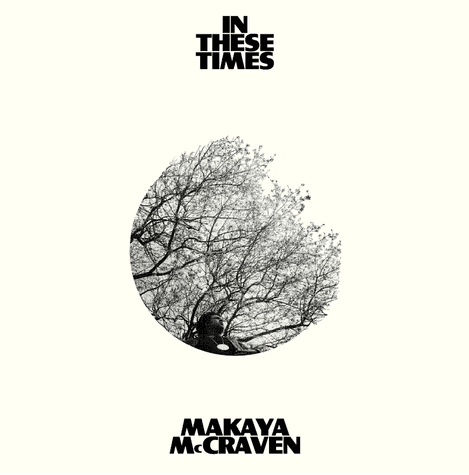Makaya McCraven offers up glimmers of hope on In These Times
"In These Times"

The spirit that envelops Makaya McCraven’s music has always served to breathe life into the past.
Whether delving into Blue Note’s archives with last year’s Deciphering the Message, or creating an homage to Gil Scott-Heron’s legacy with We’re New Again, the Chicago-based producer opts for a simpler, albeit just as gratifying approach with his latest, In These Times. Still and all, these songs illuminate with dazzling results. From bits of world music, soft-hued arrangements, and moments that evoke late night jam sessions, McCraven pivots away from concepts he's chased after before. The allure here, rather, is an album fascinating to unpack from an artist whose come full circle. McCraven isn’t just creating modernized jazz; he’s taking the time to break it down and inject it with creativity and soul.
A title like In These Times bears a lot of weight. Factoring in the past few years, existence is more fragile and we live in a time that feels particularly daunting. Even so, this isn’t lost on McCraven. Over seven years in the making, he’s carefully curated an all-star line-up of musicians – from Jeff Parker to Brandee Younger, and Greg Ward, this work brims with depth and culture. Capturing time and space as he does so precisely, these songs are lighter, looser—and more varied. Its pace ebbs and flows and entirety feels magical under McCraven’s artful thumb. But perhaps a more significant takeaway here isn't so much one at all. Maybe at the heart of it all, McCraven’s gently urging us to simply be in the moment.
With McCraven at the helm, we succumb to the act of deep listening and we can’t help but think of others who work in similar mediums. Take for instance artists like Nala Sinephro and her marvelous debut, Space 1.8 – or even Floating Points and Pharoah Sanders’ Promises. While they all share a kindred vision, McCraven can borrow similar cues, but what he offers here is a more colorful, lively interpretation and we hear these ideas showcased throughout. First single, “Seventh String,” is pleasantly everywhere. With frenzied, delicate percussion, its base is centered around lighthearted, warm arrangements. Other tracks pull back and focus on substance. “The Fours” embraces the art of repetition. It’s McCraven working within a world fueled by experimental jazz, subtly building layers upon layers until the song itself becomes this all-consuming force; it’s jazz’s version of krautrock. But this is precisely why McCraven’s work is so delightful. He’s borrowing from an infinite spectrum of sound and genre: Classical, easy-listening, even cinematic—these songs check all the boxes and while this sort of approach could easily be off-putting in a different setting from a different artist, McCraven’s delicate wherewithal in pulling it all together is precisely what makes it such a success.
Other tracks hold their own, too. “The Calling” locks into horn-centered, spiritual jazz, while album closer, “The Title,” take us out with a smooth, steady groove before its elegant finish. Tracks like “This Place That Time” are welcomed additions to McCraven’s canon as well. Adorned with string arrangements, it’s a solid piece of jazz fusion that helps round the album’s softer moments. The takeaway here is that it feels as though McCraven has finally come into his own. There’s energy here and an infinite thrum that coruscates through his work and he gently reminds us just how soul-stirring certain moments can be if we’re willing to give them our undivided attention. Here, for us, the act of listening becomes an essential experience. We lean into it and let it wash over us. This isn’t just required listening; it’s also a realization that McCraven’s efforts offer us a glimmer of hope – somehow lifting us up and pushing us towards the heavens.
Get the Best Fit take on the week in music direct to your inbox every Friday

Tunde Adebimpe
Thee Black Boltz

Julien Baker & TORRES
Send A Prayer My Way

Bon Iver
SABLE, fABLE





